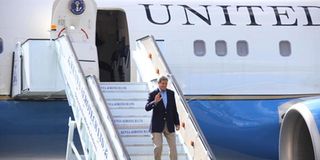John Kerry in Kenya after years of estrangement

US Secretary of State John Kerry arrives at the Jomo Kenyatta International Airport in Nairobi on May 3, 2015. PHOTO | BILLY MUTAI |
What you need to know:
- Top US diplomat arrives for talks on security cooperation.
- Kerry arrived from Sri Lanka on Sunday and leaves on Tuesday
NAIROBI
US Secretary of State John Kerry arrived in Kenya on Sunday for talks on security cooperation and ahead of US President Barack Obama's visit to his late father's home country.
The trip is the first high-level visit to Kenya since 2012, and comes after a year of tension surrounding President Uhuru Kenyatta being charged by the International Criminal Court for crimes against humanity.
The ICC has since abandoned the case against President Kenyatta over his role in the 2007-2008 post-election violence, citing a lack of evidence and Kenya's failure to cooperate — somewhat removing Kenyatta's pariah status.
"We've had a long relationship with Kenya that goes back more than 50 years, and we have had continuous economic and cultural ties with the Kenyans, and this has never ended. So this trip is not about making amends," a State Department official said.
"It's about reinforcing and deepening the relationship that we have had with Kenya, and it's also partially in preparation for President Obama's trip that's going to take place at the end of July."
SECURITY ARRANGEMENTS
Kerry arrived from Sri Lanka on Sunday afternoon and leaves on Tuesday, during which he will also meet with President Kenyatta.
The plane carrying Mr Kerry touched down at the Jomo Kenyatta International Airport at exactly 3:07pm, a few minutes before Foreign Affairs Cabinet Secretary Amina Mohammed arrived at the Presidential Pavilion to receive him.
Mr Kerry arrived under the watchful eye of US Secret Service agents who took over the security arrangements at the airport. He was met on arrival by Amb Mohammed, the US Ambassador to Kenya Robert Godec and senior embassy officials.
There was slight confusion when Mr Kerry walked to and attempted to enter a vehicle before he was intercepted by Secret Service agents who then directed him to another armoured limousine that was parked behind it.
Armoured US embassy vehicles waited at the airport for over eight hours ahead of Mr Kerry's arrival.
The Secret Service took charge of the security arrangements with the help of Kenya Airports Police Unit (KAPU) officers and security officers from the Kenya Airports Authority (KAA).
The agents worked closely with the officers from the General Service Unit’s Recce squad who were deployed within the airside while other officers were deployed on the periphery. There was at least one Secret Service agent in all the police cars that were in the convoy from the airport.
All visitors at the airport, including journalists, were comprehensively screened. The journalists’ identification documents were scrutinised and all equipment and personal belongings were scanned.
A 7-year-old Egra sniffer dog which had been brought from the US was used to search for explosives.
Mr Kerry will on Monday visit the 1998 US Embassy bombing memorial at 7am before proceeding to State House at 9am where he will meet President Kenyatta for security-focused talks.
At 11am he expected to meet opposition politicians led by Cord leader Raila Odinga. At 2pm, Mr Kerry will be in Westlands to visit the UNHCR offices and then address a press conference at the Sankara Hotel.
MASSACRES
The fight against Somalia's Al-Qaeda-linked Al-Shabaab militants will feature high on the agenda, with Kenya struggling to stop increased cross-border attacks by the militants even though it has thousands of troops in southern Somalia.
Last month Al-Shabaab gunmen massacred close to 150 people, mostly students, in a raid on Garissa University in the northeast.
The raid followed a string of other massacres in the northeast and the coast, and after the September 2013 siege of the Westgate shopping mall in Nairobi which left at least 67 dead.
"We think the Kenyans are doing their best. Fighting terrorism is tough, and particularly fighting it in this region is very tough," the State Department official said.
"Kenya has been the victims of multiple attacks — the Garissa attack starkly illustrated the extent to which Al-Shabaab can have an impact on innocent civilians. And so we will be looking at additional ways that we may be able to support the Kenyan efforts to fight Al-Shabaab."
Diplomats said Kerry would nevertheless raise human rights issues with President Kenyatta, whose government has been accused of clamping down on civil society groups and the press.
The top US diplomat will also meet Kenyan opposition leaders and rights activists.
"We continue to express our concerns to the Kenyan government. The ICC case against President Kenyatta has ended, but we have also continued to say that the issues that came out of that election must be addressed," the US official said.
"We will be meeting with civil society organisations. We will be encouraging the Kenyans to look at their civil society laws and to ensure that their laws are not putting undue pressure on civil society… We will be encouraging the government to respect civil society, to also respect the rights of the press," the official added.






